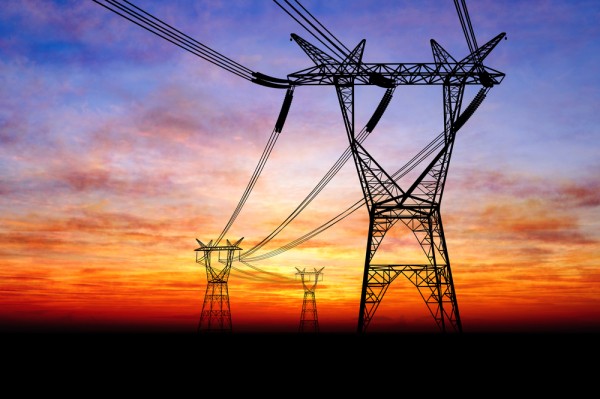
What happens when there's no Internet?
Yesterday, afternoon I feverishly worked on a commentary about Florian Mueller's ridiculous commentary (it doesn't qualify as analysis) on Google actions in relationship to Android OEMs, based on documents from a lawsuit with Oracle. I had real writing flow, likening Mueller to Santa Claus bringing Apple Fanclubbers and their anti-Google kin a heap load of presents. They've been blogging, tweeting and sharing about how evil is Google; they're giddy as can be. But I explained the bag contained nothing but coal, and that Mueller had cast a spell over them, as they were trying to do to others. I never finished that missive, and won't now. At 3:38 p.m. PDT, the electricity went out. The outage was massive -- parts of Arizona, New Mexico, Northern Mexico, all of San Diego County and sections of Orange County, which is just south of Los Angeles.
No power meant no Internet, and I was working on the Samsung Series 5 Chromebook. Google's Chrome OS would preserve the work already done in the browser, but I dared not do anymore since persistent Net connection is recommended. So I fired up the laptop's built-in Verizon wireless 3G modem, which I had never used. One of Chromebook's benefits: Free 3G data for two years -- 100MB per month, with option to get more without contractual commitment. I managed to activate the modem but couldn't make another connection and wouldn't until 5 hours later.
I hadn't ever worried about connecting Chromebook before should I lose Internet connectivity at home because 1) There was the 3G modem as backup and 2) WiFi is everywhere. But neither is anywhere when everywhere is powerless.
Initially, there was cellular telephony and data, but only within the first 45 minutes after the power failed. That was enough time for me to use the Nexus S to post a notice on Betanews' group chat service and to Google+. Then data died. Three or four times during the outage Google+ and email notifications came through and one text message. But otherwise I had no Internet connection. My daughter, who has iPhone 4, was offline, too. But not my wife, who also has Nexus S but running on T-Mobile. She had data connection throughout most of the power outage (so much for #1 largest US carrier Verizon and #2 AT&T).
Feeling Powerless
She got online and started checking news headlines. A local Fox News affiliate reported first: The outage was widespread, with uncertain cause. We would later learn that 1.4 million were without power and every one of San Diego Gas & Electric customers. The company sent an email at 7:23 p.m. PDT acknowledging widespread outage related to a "widespread transmission issue on the grid that serves Western Arizona and Southern California".
The only information I had at around 4:45 p.m. was what my wife got from her phone. I immediately asked her to rush to the local market for ice. Surely, the guy running it wouldn't let the power stop sales. Sure enough, he was taking cash, calculating tax in his head and writing down transactions on paper. My wife bagged two bags of ice, behind someone with 10. Minutes sale, the market sold out. That ice allowed us to save the food in our refrigerator.
Later I drove to the local plaza, where there is a Ralph's supermarket and Trader Joe's. Both were closed. Outside the TJ's, employees sold water -- at the astronomical price of (get this) 50 cents a bottle. That's what it usually costs. Rather than gouge customers as someone else might have, these guys were fair; it's helluva great customer service and helped calm people frantic to stock up supplies. I bought five bucks worth as precaution.
The power outage put our family, and I observed many others, at grave informational disadvantage. We were blind ducks quacking around for water, which had dried up and we didn't know why it was gone or when it was coming back. We don't have radios. Ours is an Internet household. We don't even watch news on TV. Without Internet, we had no source of news. Throughout the neighborhood, I spotted groups of people gathered around cars, SUVs and trucks listening to their vehicular radios. Most of the local stations weren't broadcasting because they had no power. The few on air had stopped all regular programming for blackout coverage.
While driving to the local plaza, one news reporter interviewed people who had fled the freeway looking for gas, because their tanks were low. One guy didn't make it. He abandoned his vehicle. Others waited in a line of cars -- a "parking lot", the reporter said -- outside a closed gas station, where employees huddled close together inside in the dark. They dared not leave, and perhaps for good reason. The line of cars went on and on and on, the reporter said.
Another reporter talked about the information crisis and how some people still had Twitter and that was the only way they got any news about the blackout. They had no radios, either. TVs were out, of course, because there was no power. But mainly people communicated by text message, which was the only sure thing still flowing across local cell networks.
But for the most part, there was no Internet anywhere. Habits die hard. I walked outside my apartment complex and saw a couple young men, woman and dog hanging out by a truck listening to its radio. The guys had tuned in a sports game. The woman held her cell phone, screen lit up. "You have Internet?" I asked. She shook her head. She clearly was trying to get it but couldn't. My daughter commandeered my wife's phone, which had consistent flow of text messages and even Facebook access. Hey, she belongs to the connected generation. Losing the Internet is like cutting off a limb.
I study people; it's one of the things that makes me good at my job. I observed startling changes throughout the neighborhood. People gathered outside in little groups on the grass, because it was too hot indoors. The power failed during a heat wave, one weather forecasters promised would break as early as overnight. But that was no respite yesterday afternoon.
I've lived here nearly four years and got to meet many neighbors for the first time. The sound of talk was everywhere. I saw pairs of people or groups walking around chatting away. Normally, I see individuals walking dogs or using smartphones or iPods. Suddenly people interacted with those closer to them rather than those far away on Facebook, text messaging or Twitter. It was a refreshing change.
Goddamn DRM
Back home, as darkness fell, my daughter settled down to watch a movie she had bought from iTunes years ago. I decided to read an ebook on the Samsung Galaxy Tab 10.1 tablet. But damnit, I hadn't downloaded most of my purchased books from Amazon. I remembered fetching them, but that must have been a mis-memory; I had done it for the cell phone, which power was near gone. That was my first bitter taste of digital rights management problems of the evening. Another soon followed.
My daughter's aluminum MacBook battery had run down before the movie finished. No problem, my wife's computer has the same movie. I fired up iTunes and clicked the movie and got a username and password dialog. The computer hadn't been authorized to play the movie, which had been purchased on my daughter's iTunes account. No Internet. No authorization.
No problem, still. I had purchased some movies, too. I switched to my account and clicked a film, only to get the same dialog box. WTH? I wasn't authorized, either! After the power resumed, I authorized the computer for my daughter's account and tried to do the same with mine. But iTunes brought up notice that the MacBook Pro already was authorized for my account. Lovely. Goddamn DRM.
Around 10 p.m., I tried to connect up the Chromebook to Verizon's 3G network and did! Woo hoo! About 40 minutes later, the power came back on. Soon after, AT&T's data network started working again. So my wife asked for her smartphone. But my daughter wouldn't give it up. She complained that AT&T service wasn't working, but I could see that it was. I think my daughter liked the Nexus S, not that she might ever admit it.
Soon as I got back online, I zipped over to Amazon. Everything had changed. Whoa! It's a site redesign. Then I ordered the radio that's been on my shopping list for more than a year: Grundig Satellit 750. I also looked over the Mueller commentary and decided I wouldn't have time to finish it. But there's a great response everyone should read: "The Bombshell That Wasn’t: FOSS Patents’ Android Scoop Misses The Mark" by Jason Kincaid for TechCrunch.
Last night, around 11:30, my daughter popped out of her bedroom and warned: "Don't drink the water". "Why?" my wife asked. "It's contaminated", she answered. "How do you know?" "Someone put it on Facebook". There you go, the authority on everything. Eh?
Photo Credit: TebNad/Shutterstock






 If you’re a data-heavy smartphone user, you belong on Sprint. That’s the findings of
If you’re a data-heavy smartphone user, you belong on Sprint. That’s the findings of  It has been a year since Bing
It has been a year since Bing 